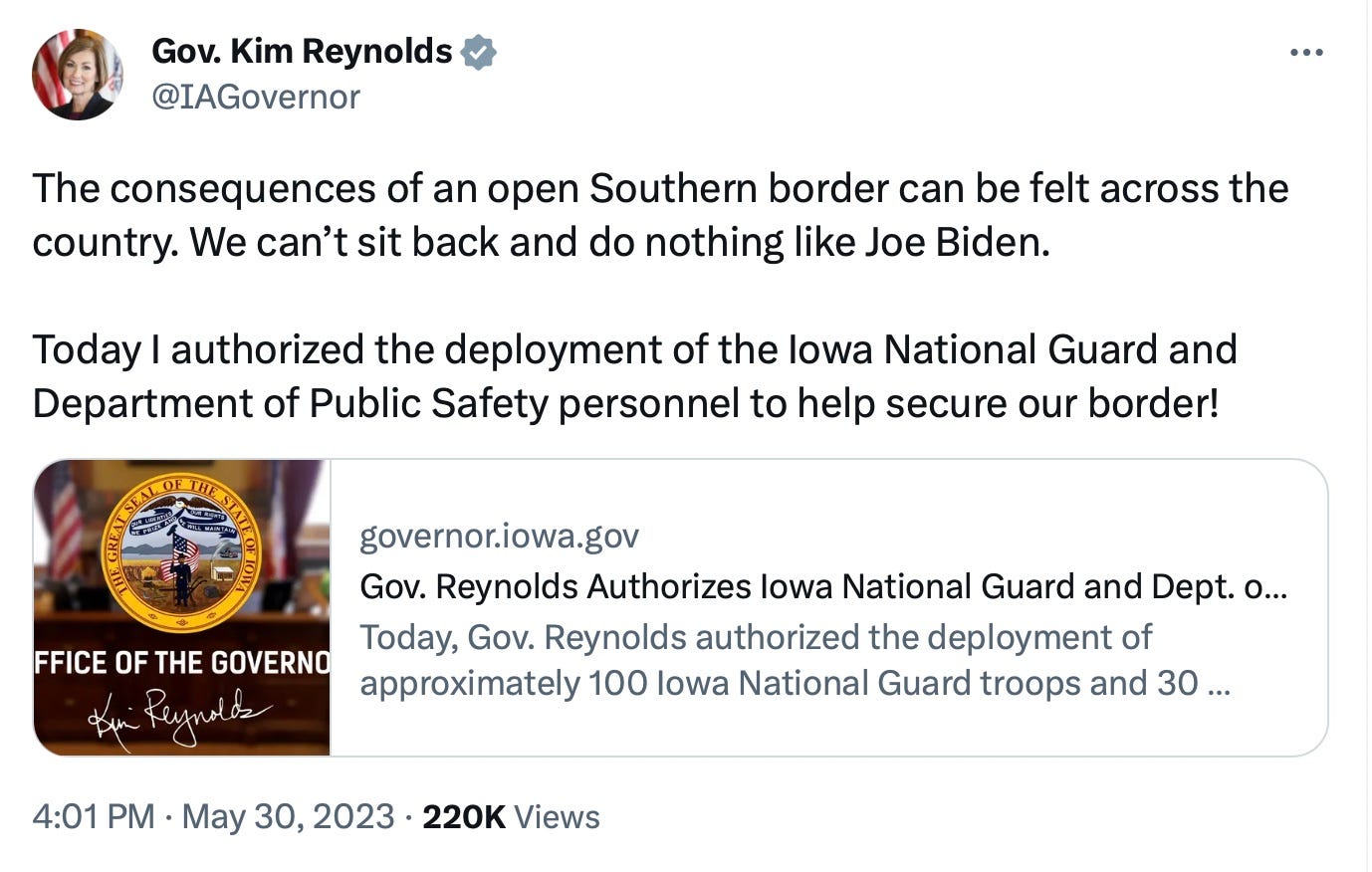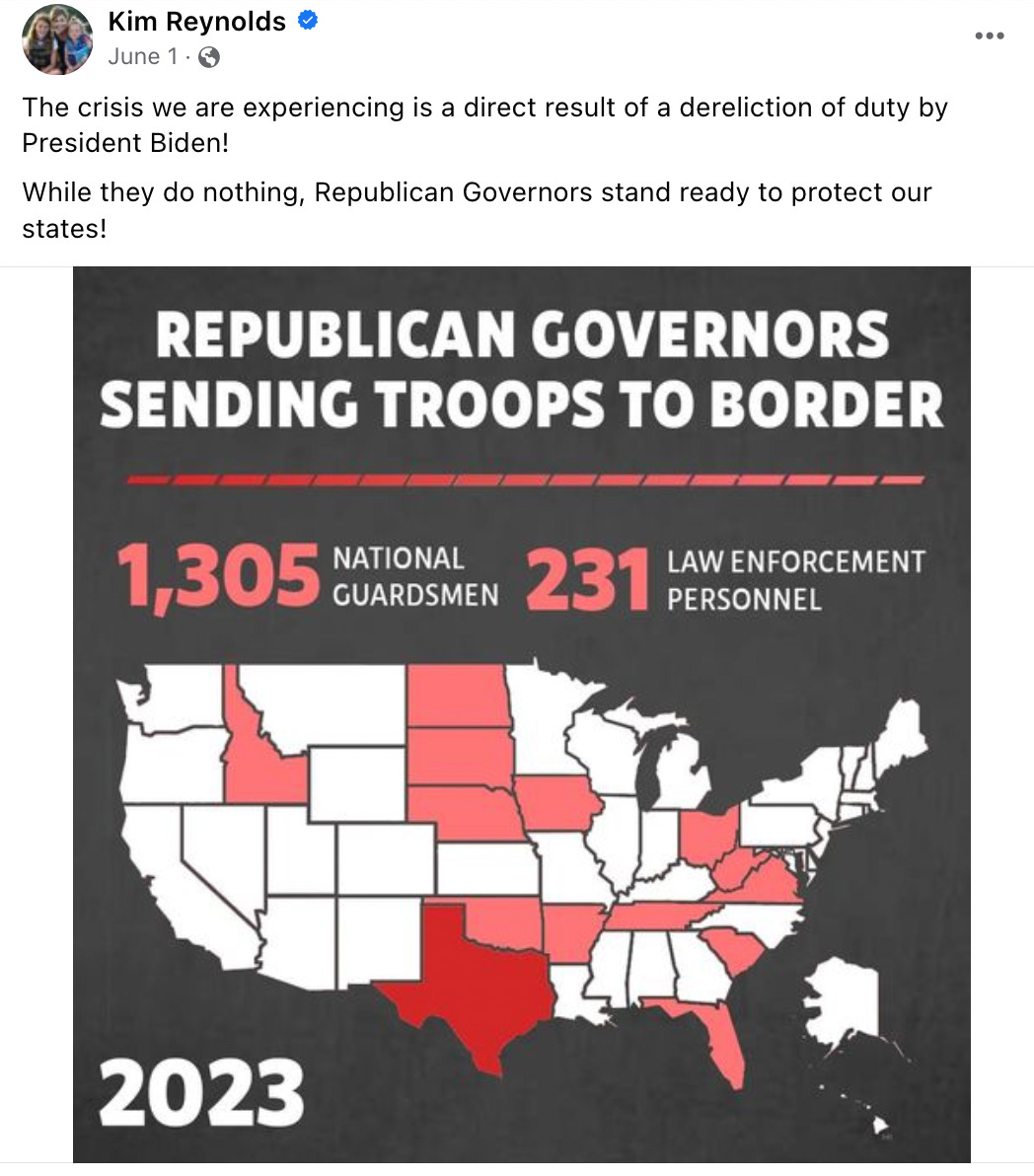
This original reporting and analysis first appeared at Bleeding Heartland and is shared here as part of the Iowa Writers Collaborative. For regular emails linking to all recent Bleeding Heartland articles and commentary, subscribe to the free Evening Heartland newsletter.
Governor Kim Reynolds announced on August 2 that 109 Iowa National Guard soldiers were en route to Texas, where they will be deployed through September 1 "in support of Operation Lone Star to help secure the U.S. Southern Border following the end of Title 42." In addition, the Department of Public Safety will send Iowa State Patrol officers to Texas from August 31 through October 2, to assist Texas state troopers with various law enforcement activities.
The governor's news release confirmed that "federal funding allocated to Iowa from the American Rescue Plan" will cover "all costs" associated with these deployments. The statement went on to assert, "States are given flexibility in how this funding can be used provided it supports the provision of government services."
Not so fast.
While the American Rescue Plan did give states more leeway than previous federal COVID-19 relief packages, ARP funds are still subject to detailed federal rules. A plain reading of those regulations suggests deploying Iowa National Guard and law enforcement to the U.S. border with Mexico does not fall under any eligible category.
Reynolds' public statements about Operation Lone Star also confirm the mission is not related to the pandemic.
The governor's spokesperson Kollin Crompton ignored Bleeding Heartland's questions about Reynolds' decision to tap this funding stream for Texas deployments. The Iowa Department of Management, which monitors the state's use of federal COVID-19 relief funds and reports on how Iowa has used ARP funds, referred questions to the governor's office.
It's not clear whether anyone on the governor's staff or in the Iowa Department of Management conferred with federal officials or state auditors before Reynolds authorized the use of ARP funds for Operation Lone Star. Staff in the U.S. Treasury's Office of Inspector General did not respond to Bleeding Heartland's inquiries. Sonya Heitshusen, public information officer for the Iowa State Auditor's office, responded only in general terms: "The Office will review spending and make final determinations about the legality and appropriate use of American Rescue Plan funds in the course of its work."
"TO PROVIDE GOVERNMENT SERVICES UP TO THE AMOUNT OF REVENUE LOST DUE TO THE PANDEMIC"
Soon after Democrats in Congress approved and President Joe Biden signed the ARP in 2021, Reynolds bashed the law as an "overreaching, unconstitutional stimulus bill that does nothing but bail out blue states."
Now she would have Iowans believe the ARP is a blank check for anything a red-state governor wants, as long as the program "supports the provision of government services."
That's not accurate. The ARP allocated $350 billion in State and Local Fiscal Recovery Funds to facilitate state, territorial, local, and Tribal governments' "response to and recovery from the COVID-19 public health emergency."
The law outlined four broad areas where governments can use those fiscal recovery funds. Three of them are not relevant to this discussion: to address the "negative economic impacts" of the pandemic through "assistance to households, small businesses, and nonprofits, or aid to impacted industries such as tourism, travel, and hospitality"; to provide premium pay for essential workers; and to "make necessary investments in water, sewer, or broadband infrastructure."
Reynolds is hanging her hat on a fourth category of allowable spending. The Treasury Department summarized it as follows (emphasis in original): "Replace lost public sector revenue, using this funding to provide government services up to the amount of revenue lost due to the pandemic."
The final rule adopted in 2022 put it this way: "For the provision of government services to the extent of the reduction in revenue due to the COVID–19 public health emergency relative to revenues collected in the most recent full fiscal year prior to the emergency." The regulations explained the federal government's intention in great detail, beginning on page 4400. Excerpt (emphasis added):
This provision allows recipients experiencing budget shortfalls to use payments from the SLFRF funds to avoid cuts to government services and, thus, enables state, local, and Tribal governments to continue to provide valuable services and ensures that fiscal austerity measures do not hamper the broader economic recovery.
The state of Iowa has a large budget surplus, not a shortfall.
Moreover, sending National Guard personnel and state troopers to Texas is not a way "to avoid cuts to government services" here. Nor does it "continue to provide valuable services" Iowans already receive. On the contrary: one could argue these deployments will reduce available services to Iowans, as state troopers spend a month in Texas instead of performing their usual duties.
Reynolds claimed last week that the deployments will help Iowans because "every state is a border state, and Iowa’s unique location at the intersection of two major interstates makes it a target for human traffickers and drug cartels."
Whatever your views on immigration policy or the value of sending Iowa personnel to Texas, the fact remains that the ARP allocated funds to help state and local governments adapt to "revenue reductions caused by the public health emergency."
When state or federal auditors review the use of ARP funds for Operation Lone Star, the Reynolds administration will struggle to demonstrate the program had any relationship to the pandemic.
"A DIRECT RESULT OF A DERELICTION OF DUTY BY PRESIDENT BIDEN"
In her office's August 2 news release, Reynolds elaborated on the reason for the mission:
On his first day in office, President Biden reversed commonsense policies that protected the U.S. Southern border and American citizens. Since that time, our country has experienced a historic rise in illegal immigrants and illicit drugs entering our country. Two years later, every state is a border state, and Iowa’s unique location at the intersection of two major interstates makes it a target for human traffickers and drug cartels.
The Biden Administration has failed to respond to the crisis at the border and, in doing so, has failed the American people – Iowans included. They have created one of the most significant national security and humanitarian crises of our generation and are blatantly ignoring the impact it’s having on our states, cities, and our people.
Since the administration refuses to invest in securing the border and protecting its citizens, Texas has asked other states to help, and Iowa is ready and willing to assist.
Iowa is deploying National Guard troops and personnel from the Department of Public Safety to protect the citizens and interests of our state by supporting Operation Lone Star and helping secure the U.S. Southern border.”
What's missing from this picture? Any reference to the COVID-19 pandemic. It's all about the Biden administration's alleged negligence: they "failed to respond" to the border crisis, "have created" a humanitarian crisis, and "are blatantly ignoring" its impact. Iowa and other states are sending troops to Texas not because of ongoing fallout from the pandemic, but because the Biden administration "refuses to invest in securing the border."
The day Reynolds announced the planned deployments in May, she tweeted from her official account, "The consequences of an open Southern border can be felt across the country. We can't sit back and do nothing like Joe Biden."
Two days later, Reynolds posted on her political Facebook page, "The crisis we are experiencing is a direct result of a dereliction of duty by President Biden!"
In reality, southern border crossings declined after the Biden administration ended the "Title 42" policy in May, and the downward trend continued in the early summer. But that's a topic for another day.
Whether it's a good or bad idea to send Iowans to Texas over the next two months has no bearing on whether Reynolds is allowed to use ARP funds for that purpose.
When auditors review these expenditures for compliance with federal law, they won't ask whether the governor was right to help secure the southern border.
Rather, they will consider whether the spending helped Iowa replace revenue lost due to the pandemic, and provide government services that would otherwise have been cut because of those revenue losses.
Final note: if federal auditors eventually determine Operation Lone Star was not an allowable use of ARP funds, the remedy will be for Iowa to return the money. In 2020, Reynolds had to return $21 million to Iowa's Coronavirus Relief Fund after she attempted to spend CARES Act money on the Workday computer system. Republican lawmakers later approved a special appropriations bill to use state funds for the Workday costs.
UPDATE: In her Noheartland newsletter, Andy Kopsa also questioned the use of ARP funds for this deployment and has sought comment from Treasury's Office of Inspector General.
The Des Moines Register's Stephen Gruber-Miller reported,
Kollin Crompton, a spokesperson for Reynolds, said Reynolds has used the money for projects "aimed at strengthening the state's economy, workforce, infrastructure and public health."
"This investment is no different. The health of our people and economy is directly threatened by the illegal drugs flowing through the southern border and into our state," he said in a statement, pointing to an increase in fentanyl and methamphetamine seizures in Iowa since the start of the pandemic.
Have you checked out the other offerings from the Iowa Writers Collaborative? All of these newsletters are available for free, or you can choose to support the writer with a paid subscription.
Laura Belin: Iowa Politics with Laura Belin, Windsor Heights
Doug Burns: The Iowa Mercury, Carroll
Dave Busiek: Dave Busiek on Media, Des Moines
Steph Copley: It Was Never a Dress, Johnston
Art Cullen: Art Cullen’s Notebook, Storm Lake
Suzanna de Baca: Dispatches from the Heartland, Huxley
Debra Engle: A Whole New World, Madison County
Julie Gammack: Julie Gammack’s Iowa Potluck, Des Moines and Okoboji
Joe Geha: Fern and Joe, Ames
Jody Gifford: Benign Inspiration, West Des Moines
Nik Heftman: The Seven Times, Los Angeles and Iowa
Beth Hoffman: In the Dirt, Lovilla
Dana James: New Black Iowa, Des Moines
Pat Kinney: View from Cedar Valley, Waterloo
Fern Kupfer: Fern and Joe, Ames
Robert Leonard: Deep Midwest: Politics and Culture, Bussey
Letters from Iowans, Iowa
Tar Macias: Hola Iowa, Iowa
Kurt Meyer: Showing Up, St. Ansgar
Wini Moranville, Wini’s Food Stories, Des Moines
Jeff Morrison: Between Two Rivers, Cedar Rapids
Kyle Munson, Kyle Munson’s Main Street, Des Moines
Jane Nguyen, The Asian Iowan, West Des Moines
John Naughton: My Life, in Color, Des Moines
Chuck Offenburger: Iowa Boy Chuck Offenburger, Jefferson and Des Moines
Barry Piatt: Piatt on Politics Behind the Curtain, Washington, D.C.
Dave Price: Dave Price’s Perspective, Des Moines
Macey Spensley: The Midwest Creative, Iowa
Larry Stone: Listening to the Land, Elkader
Mary Swander: Mary Swander’s Buggy Land, Kalona
Mary Swander: Mary Swander’s Emerging Voices, Kalona
Cheryl Tevis: Unfinished Business, Boone County
Ed Tibbetts: Along the Mississippi, Davenport
Teresa Zilk: Talking Good, Des Moines
To receive a weekly roundup of all Iowa Writers’ Collaborative columnists, sign up here (free): ROUNDUP COLUMN
We are proud to have an alliance with Iowa Capital Dispatch.






Many Governors send their National Guard to address domestic crises of the moment, such as natural or environmental, or manmade. In the last 6 months, our Governor had the opportunity to send the Guard to help Marengo with its environmental crisis and clean up (the Governor dropped the ball and punted the problem to the federal govt). More recently, our Governor could have sent the Guard to help in rescue and recovery of the Davenport tragedy and to assist the under-staffed local emergency responders. In comparing priorities, Iowans can decide whether our Governor decided to “use” members of the Guard to score political points. I don’t think people in Marengo and surrounding communities, nor Davenport, care about political points; they would prefer that state resources be devoted to helping with local manmade tragedies.
Another arrogant move by our Governor. Playing to the base and setting up another fight with Auditor.